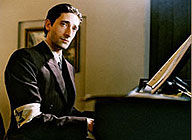|
|
|
|
The
Pianist
|
 |
|
There is a certain, Hollywood way of representing and dealing with the Holocaust. It finds its supreme expression in Steven Spielberg's Schindler's List (1993). There is a mass of people, in a Ghetto or a camp. The camera picks out one person – the hero – as he observantly makes his way through this mass, helping one person in need, fleeing the hysterical, deranged cries of another. Hollywood has often tried to symbolise the plight of an entire people through the saga of a single individual's journey. But the focus on a special person – braver, more resilient, more righteous than his neighbours – often ends up obscuring many of the political and social conditions that have created history and given rise to its traumas. This familiar shot of an individual making his way through a crowd reappears fairly early on in Roman Polanski's The Pianist, based on the memoirs of Wladyslaw Szpilman (incarnated brilliantly by Adrien Brody). But the film will subsequently give this iconic image two, devastating twists. The first twist comes when the image is replayed – but this time, there is no crowd, only Szpilman wandering in distress amidst the ruins of the Warsaw Ghetto, scattered suitcases mingled with dead bodies. The second twist comes when Szpilman must hide from German soldiers on a similar strip of street. His only recourse is to pretend to be one of the dead bodies around him. This individual is not so special, and he is fully subsumed into a collective tragedy. The Pianist is a sobering account of this period in Polish history. Polanski seized on Szpilman's account because it had the honesty and objectivity to record the actions of "decent Poles and evil Poles, decent and evil Jews, decent and evil Germans". The film is entirely free of sensationalism – remarkably so, when we remember that Polanski is a master of horror and the grotesque. Terrible atrocities are shown in their cruel, matter-of-fact suddenness, without dramatic exaggeration or underlining. Polanski appears to have been guided, stylistically, by Roberto Rossellini's seemingly dispassionate stories of the Second World War, especially Paisà (1946). Szpilman is very much like Rossellini's famous sleepwalkers, ordinary people who absorb the shocking events around them and either collapse into paralysis or hit back impulsively. For once, an advertising tag is perfect: "Survival was his masterpiece." Szpilman spends most of his time hiding, often in coffin-like darkness and silence, as he wastes away physically. An extraordinarily poetic moment shows him gloriously playing the piano as he did before the war – but his hands are suspended above the keys, and the music is all in his mind. The Pianist is, by any reckoning, a superbly crafted and powerful film. But it is possible to feel that Polanski has pulled his punches somewhat, taking a rather safe approach in his ultimate bid for cultural respectability. Polanski skirts many of the moral issues that are typically raised in stories of the Holocaust. The question of how far Szpilman compromises himself in order to survive in the Ghetto is left moot. The matter of survivor guilt which so haunts Schindler's List is here absent – indeed, the strangest gap in the story is any mention of the precise fate of Szpilman's family members after they are forcibly taken from the Ghetto. Polanski has stated that his film is about "the courage to stand against evil". But, despite some scattered acts of individual compassion, this is not a tale of grand heroism, and hardly a celebration of collective resistance. It has that solipsistic, Kafkaesque, man-against-fate ambience we know so well from every other Polanski movie. A reading of Roman, Polanski's intriguing 1984 autobiography, reveals not only the proximity of Szpilman's experiences to his own, but also the fatalistic sensibility that may prevent this auteur from finding any positive moral value in the material. Polanski is a cynic, and he reserves his cynicism particularly for the political history he has witnessed across many continents, with its parade of combating ideologies. Wars, resistance movements, May 1968 in Paris: all bring froth from him the same 'I've been there and I know how it will end' sarcasm. In this light, perhaps the central scene of The Pianist comes near the end, when Szpilman, assuming he has at last been saved, faces his rescuers wearing the German army coat that keeps him warm: immediately, these saviours open fire on him. This is a perfect illustration of Polanski's idea of history as one big theatre of the absurd. Survival is not only Szpilman's masterpiece, but also Polanski's. The director's life story is a journey from menaced anonymity to international celebrity, with all the perks thrown in. But life in the free world has not been easy either for Polanski, dogged as he has been by tragedy and the errors of his own way. For him, the story of The Pianist surely represents, symbolically, the best half of this turbulent autobiography: the overcoming of impossible odds and the wild, public acclaim that follows as a reward. It would take an even greater filmmaker, Alexander Sokurov or (if he were alive) Stanley Kubrick, to go any deeper into the thorny complexities of the twentieth century's largest horror. MORE Polanski: Chinatown, Cul-de-Sac, Death and the Maiden, The Fat and the Lean, The Fearless Vampire Killers, Frantic, The Ninth Gate, Repulsion, The Tenant, Tess, Two Men and a Wardrobe, Knife in the Water, Rosemary’s Baby © Adrian Martin March 2003 |
![]()